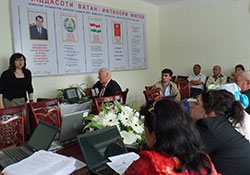WHO supports health workforce development in Tajikistan

WHO/Tahmina Alimamedova
A three-day, capacity-building workshop for paediatricians was held on 24–26 April 2012 in Dushanbe, Tajikistan. Organized by WHO in cooperation with the Ministry of Health's Republican Pediatrician Center and Child Surgery, the workshop provided training in the use and adaptation of an innovative computerized tool (ICATT) developed to help countries implement the WHO/UNICEF strategy on Integrated Management of Childhood Illness (IMCI).
Dr Aigul Kuttumuratova of WHO/Europe and WHO consultant Dr Ivan Lezhnev led the workshop, which focused on ICATT in relation to achieving national Millennium Development Goal (MDG) targets, especially MDG 4 on reducing child mortality, and quality training of medical personnel. Additional topics of discussion included implementation of the IMCI strategy at global, regional and country levels and adaptation of ICATT for different categories of professional health workers.
Rationale
The following rationale were compiled for implementation of the ICATT approach in Tajikistan:
- The knowledge and skills of care providers (paediatricians, family physicians, nurses and other paramedical staff) need to be significantly improved with respect to managing common paediatric problems.
- Achieving MDG 4 will require integrated child services throughout the country provided by health workers trained in IMCI.
- The cost of maternal and child health (MCH) training needs to be reduced, by introducing innovative, effective and at the same time low-cost methods of knowledge acquisition and skills development.
- The range of teaching/learning models used in the country needs to be expanded (e.g. to include individual self-learning in pre- and in-service settings, specifically tailored courses for individual groups of health workers; and distance learning courses using computers and internet or satellite-based facilitation).
- The quality of paediatrics needs to be increased in both pre-service (Dushanbe medical university, medical colleges) and in-service settings.
The workshop participants appreciated the opportunities offered by ICATT and expressed their readiness to actively participate in its adaptation and implementation in Tajikistan.



